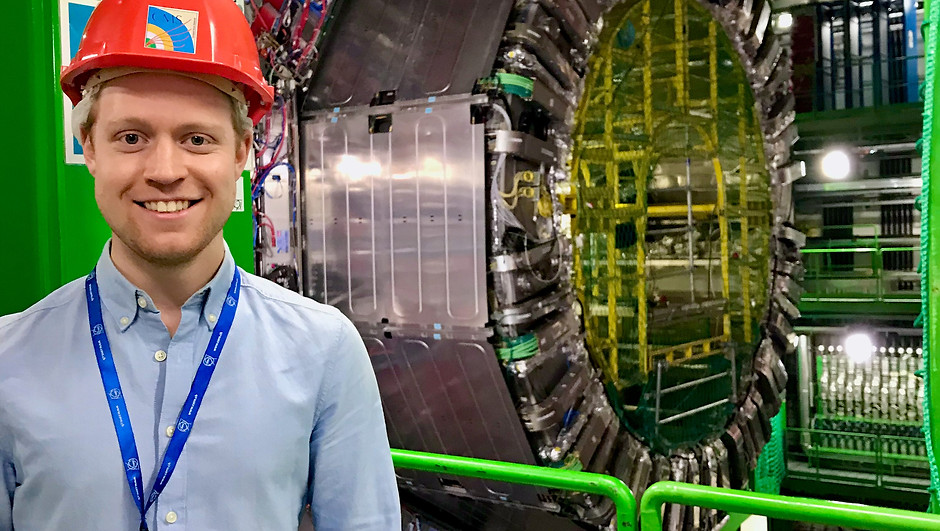Behind the Scenes of CoE-RAISE: An interview with Eric Wulff, AI Software Developer at CERN (Conseil Européen pour la Recherche Nucléaire)
Is there an event or person that brought you to science?
Not that I can remember, no. I have always been curious of how things work and why things are the way they are. This curiosity first led me to an interest in science in general, and later to a more specific interest in Physics. As I see it, physics is the most fundamental of the sciences because it attempts to break the world down into its most elementary building blocks. Take practically any phenomenon and ask why it works the way it does, then keep asking why enough times and you will eventually need to turn to physics to get answers.

Figure 1: Visiting the CMS experimental cavern, approximately 100 meters under ground.
In which field did you focus and what is special about it?
My background is in Physics and Artificial Intelligence (AI). I think the intersection between physics and AI is very interesting and I believe the field of physics has a lot to offer the field of AI, not least in terms of first principles thinking. So that’s part of why I’m very happy to be working on cutting-edge AI techniques here at CERN, famous for groundbreaking research in physics and technology and home to many spectacular physics experiments and particle accelerators. In addition, I believe AI also has much to offer to physics research, as well as to other sciences, both in terms of new theoretical frameworks to apply to scientific questions and in terms of faster and more accurate AI-based simulations and predictive algorithms.
In my opinion, the questions of how consciousness arises and if it is possible for AI to become conscious are among the most fascinating open questions in science today. As far as I can tell, we are still far away from being able to answer these questions, but I believe that the fields of physics and AI will be instrumental in answering them.
Is CoE RAISE the first EU project you are participating in and in which tasks are you involved in?
Yes, this is my first time working in an EU research project. I’m the task leader of Task 4.1 called Event reconstruction and classification at the CERN HL-LHC in Work Package 4, Data-driven Use-cases towards Exascale. By Exascale, we mean Exascale computing, which refers to the capability to perform a billion billion (10 to the power of 18) operations per second. Our work in Task 4.1 concerns one of the many possible solutions to challenges presented by the significant increase in data production that will follow the High Luminosity (HL) upgrade of the Large Hadron Collider (LHC). We are developing a possible replacement to the so-called Particle-Flow Reconstruction algorithm, which combines signals from different subdetectors into higher level physics objects. The replacement is an AI-based version, called the Machine Learned Particle-Flow (MLPF) algorithm, which is highly parallelizable and can be accelerated by specialized hardware such as GPUs and FPGAs. Since the training of AI models often requires a lot of compute resources, the continuous development, training and hyperparameter optimization of MLPF models benefit greatly from the High Performance Computing (HPC) resources available within the CoE RAISE project which allow us to use hundreds of the latest and greatest GPUs simultaneously.

Figure 2: Eric’s office at CERN.
What is your impression so far and what are your expectations?
In CoE RAISE, leading researchers and industry players from the fields of AI and HPC collaborate on pushing the boundaries of advanced AI techniques for Exascale HPC systems. These developments have the potential to greatly impact the field of High Energy Physics, and other sciences as well, which is in need of new methods in order to tackle the huge datasets that will be collected in the coming decade and beyond.
How do you like to spend your free time?
I love any activity in the great outdoors, which of course means that I’m really enjoying the amazing nature in the surroundings of CERN, located just outside of Geneva, Switzerland. I spend a lot of time in the mountains, hiking and wild camping in the summer and skiing, both cross-country and downhill, in the winter. This upcoming winter season I’m very much looking forward to getting more into ski touring as well.

Figure 3: Hiking near Lugano, Switzerland.

Figure 4: Skiing in Verbier, Switzerland.
Is there anything else you’d like to add?
I’m very happy to be a part of this project and would like to say thanks to CERN and all the other CoE RAISE partners and the incredibly intelligent and ambitious people working here.
Use Case - Methodologies for the event reconstruction and classification at the CERN HL-LHC





